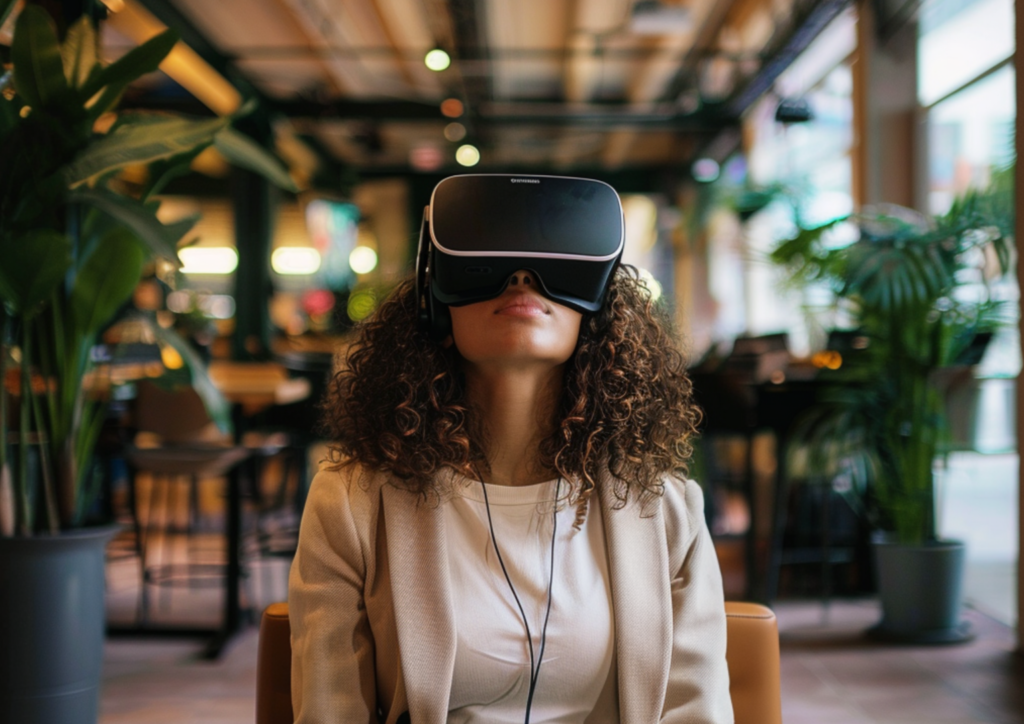

The metaverse is a term that describes a shared, persistent, and immersive virtual reality that encompasses multiple digital platforms and experiences. It is often depicted in science fiction and pop culture as a futuristic vision of the internet, where people can interact with each other in the digital world through their avatars.
But the metaverse is not just a fantasy. It is already becoming a reality, thanks to the rapid advances in technologies such as VR, AR, AI, blockchain, and cloud computing. And it has the potential to revolutionize the way we work, especially in the post-pandemic era, where remote and hybrid work models are becoming the norm.
How the metaverse can improve team collaboration and creativity
One of the main benefits of the metaverse for work is that it can enable a new level of collaboration and creativity among teams, regardless of their physical location or time zone. By creating immersive and interactive virtual spaces for meetings, brainstorming, and co-working, the metaverse can overcome the limitations and challenges of traditional video conferencing and online collaboration tools.
For example, imagine that you are part of a global team that is working on a new product design. Instead of using a flat screen and a webcam, you can put on your VR headset and join your colleagues in a virtual studio, where you can see and hear each other as if you were in the same room. You can also use 3D models, holograms, and digital whiteboards to visualize and prototype your ideas in real-time. You can even invite experts, customers, or stakeholders to join your session and get their feedback and input.
By using the metaverse, you can create a more engaging, productive, and fun work environment, where you can leverage the collective intelligence and creativity of your team. You can also foster a stronger sense of connection and trust among your team members, which can improve your team’s performance and satisfaction.
Another benefit of the metaverse for work is that it can offer new opportunities for learning and skills development, both for individuals and organizations. By using gamified and VR technologies, the metaverse can simulate real-world scenarios and challenges, and provide immersive and interactive learning experiences that can enhance the retention and transfer of knowledge and skills.
For example, imagine that you are a new employee who needs to learn about the company’s products, processes, and culture. Instead of reading a boring manual or watching a dull video, you can enter a virtual orientation program, where you can explore the company’s history, values, and vision, interact with your colleagues and managers, and complete various tasks and quizzes that test your understanding and skills.
By using the metaverse, you can accelerate your learning curve and adapt to your new role faster and easier. You can also access personalized and continuous learning opportunities that can help you grow your career and stay relevant in the changing world of work.
A third benefit of the metaverse for work is that it can promote a more diverse and inclusive work culture, by allowing people to express themselves through their avatars and connect with colleagues from different backgrounds and locations. By using the metaverse, people can overcome the barriers and biases that often exist in the physical world, such as appearance, gender, race, age, disability, or geography.
For example, imagine that you are a woman who works in a male-dominated industry. Instead of facing discrimination or harassment, you can choose an avatar that reflects your identity and personality, and communicate with your peers and clients on an equal footing. You can also join virtual communities and networks that support and empower women in your field, and access mentors and role models that can inspire and guide you.
By using the metaverse, you can create a more authentic and confident self-image, and build more meaningful and diverse relationships at work. You can also contribute to a more inclusive and respectful work culture, where everyone is valued and respected for their skills and ideas, rather than their physical attributes.
The metaverse is not only a tool for enhancing the existing ways of working, but also a platform for creating new possibilities and paradigms for the future of work. By using the metaverse, people can access new digital, AI-enabled colleagues, new metaverse-based enterprises and work roles, and new ethical and legal implications.
For example, imagine that you are a freelancer who works in the metaverse. Instead of relying on traditional platforms and intermediaries, you can use blockchain and smart contracts to secure and manage your work contracts and payments. You can also collaborate with other freelancers and AI agents to form dynamic and flexible teams that can deliver complex and innovative projects. You can even create your own metaverse-based business, where you can offer your services or products to a global and diverse market.
By using the metaverse, you can enjoy more autonomy, flexibility, and creativity in your work, and tap into new sources of income and value creation. You can also face new challenges and risks, such as cyberattacks, privacy breaches, intellectual property disputes, or ethical dilemmas.
The metaverse is not a distant or hypothetical concept. It is a present and evolving reality that has the potential to transform the way we work in profound and exciting ways. By using the metaverse, we can improve our team collaboration and creativity, enable new forms of learning and skills development, foster a more diverse and inclusive work culture, and create new opportunities and challenges for the future of work.
The metaverse is not a replacement or a substitute for the physical world. It is a complement and an extension of it, where we can augment and enhance our work experiences and outcomes. The metaverse is not a threat or a danger to our work. It is an opportunity and a catalyst for our work.
The metaverse is here. And the future of work is here. Are you ready to meet, brainstorm, and co-work in the metaverse